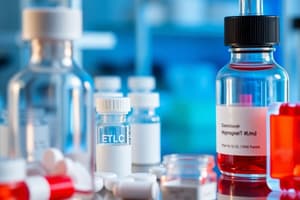Podcast
Questions and Answers
What is the primary focus of biopharmaceuticals in managing chronic diseases and autoimmune disorders?
What is the primary focus of biopharmaceuticals in managing chronic diseases and autoimmune disorders?
- Managing chronic diseases and autoimmune disorders (correct)
- Preventing infectious diseases
- Addressing mental health issues
- Enhancing physical performance
Which category of biopharmaceuticals includes proteins like insulin and calcitonin?
Which category of biopharmaceuticals includes proteins like insulin and calcitonin?
- Peptides (correct)
- Recombinant therapeutic proteins
- Enzymes
- Antibody–drug conjugates
What is the mechanism of action for monoclonal antibodies (mAbs) in the body?
What is the mechanism of action for monoclonal antibodies (mAbs) in the body?
- Mimic natural antibodies, binding specifically to target proteins (correct)
- Combine with cytotoxic agents to deliver chemotherapy
- Speed up reactions inside cells
- Act as catalysts in metabolic processes
What is the unique feature of antibody–drug conjugates (ADCs) in delivering chemotherapy?
What is the unique feature of antibody–drug conjugates (ADCs) in delivering chemotherapy?
What is a key challenge faced during the development process of biopharmaceuticals?
What is a key challenge faced during the development process of biopharmaceuticals?
What is a key challenge faced during the development of biopharmaceuticals related to manufacturing?
What is a key challenge faced during the development of biopharmaceuticals related to manufacturing?
Which stage of the biopharmaceutical development process involves evaluating safety and efficacy in animal models?
Which stage of the biopharmaceutical development process involves evaluating safety and efficacy in animal models?
What is a goal of using controlled-release systems in biopharmaceuticals?
What is a goal of using controlled-release systems in biopharmaceuticals?
What is a major impact of limited penetration due to biological barriers on alternative delivery methods for biopharmaceuticals?
What is a major impact of limited penetration due to biological barriers on alternative delivery methods for biopharmaceuticals?
Why is minimizing immunogenicity an important challenge during the development of biopharmaceuticals?
Why is minimizing immunogenicity an important challenge during the development of biopharmaceuticals?
Flashcards are hidden until you start studying
Study Notes
Overview of Biopharmaceuticals: Development Process and Challenges
Biopharmaceuticals refer to medications derived from living organisms, such as proteins, peptides, enzymes, monoclonal antibodies, and antibody–drug conjugates. They have revolutionized pharmaceutical treatments, particularly in managing chronic diseases and autoimmune disorders. The development of biopharmaceuticals involves several stages, each presenting unique challenges and advancements.
Biopharmaceutical Classification and Mechanisms of Action
Biopharmaceuticals are classified based on their origin and mechanism of action:
- Peptides: Smaller proteins with therapeutic actions, such as insulin and calcitonin.
- Recombinant therapeutic proteins: Produced using genetic engineering, such as antithrombin III and growth hormone.
- Enzymes: Naturally occurring catalysts that speed up reactions inside cells, such as trypsin and chymotrypsin.
- Monoclonal antibodies (mAbs): Engineered immune cells that mimic natural antibodies, binding specifically to target proteins and markers involved in disease processes. Examples include trastuzumab (Herceptin) and rituximab (Rituxan).
- Antibody–drug conjugates (ADCs): Combinations of monoclonal antibodies attached to cytotoxic agents, allowing targeted delivery of chemotherapy to cancer cells.
Development Process and Challenges
The development process of biopharmaceuticals includes:
- Protein discovery and selection: Identifying potential targets and candidate proteins with therapeutic potential.
- Molecular optimization: Engineering proteins to enhance stability, solubility, and potency.
- Manufacturing and purification: Developing scalable production processes to generate sufficient quantities of high-purity proteins.
- Preclinical testing: Evaluating safety and efficacy in animal models.
- Clinical trials: Assessing safety and effectiveness in humans.
- Regulatory approval: Seeking authorization from regulatory agencies, such as the FDA, for marketing and sale.
Challenges during development include:
- Stability and shelf life: Preserving protein integrity without compromising efficacy.
- Manufacturing consistency: Scaling up production without compromising product quality.
- Specificity and selectivity: Ensuring that the therapeutic molecule binds only to its intended target.
- Immunogenicity: Minimizing the likelihood of the patient's immune system recognizing and rejecting the foreign protein.
- Side effects and off-target interactions: Mitigating any unwanted effects caused by the biopharmaceutical.
- Resistance: Addressing the potential development of resistance in treated patients.
Alternative Delivery Methods
To improve patient compliance and minimize side effects, researchers explore alternative delivery routes beyond simple injection. These include:
- Transdermal: Applying medication directly to the skin surface.
- Oral: Administering orally through pills or liquids.
- Pulmonary: Inhaling medication through the lungs.
However, these methods face challenges such as limited penetration due to biological barriers and physiological differences between individuals.
Biopharmaceutical Drug Performance Enhancers
Technologies aimed at enhancing biopharmaceutical performance include:
- Pegylation: Adding hydrophilic polymers to increase the size and stability of the drug.
- Encapsulation: Surrounding the drug with protective materials to aid delivery and reduce side effects.
- Controlled-release systems: Designing formulations that slowly release the drug over time, avoiding frequent administrations.
Market Analysis and Future Prospects
According to the National Center for Biotechnology Information (NCBI), the global revenue of the biotechnology sector exceeded $163 billion in 2012, accounting for 71% of the top-selling pharmaceuticals in the U.S.. With the rise of biobetters and biosimilars, which reduce production costs and expand accessibility, the future prospects of biopharmaceuticals seem promising.
Studying That Suits You
Use AI to generate personalized quizzes and flashcards to suit your learning preferences.




